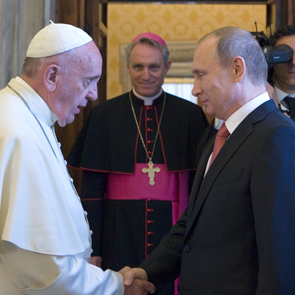A senior Vatican official has responded to criticism that Pope Francis failed to condemn Russian intervention in Ukraine when he met President Vladimir Putin at the Vatican on 10 June. The Pope has described the conflict there as a “fratricidal” or civil war, while the Western nations of the G7 regard Russia as an aggressor not only for its annexation of Crimea but for its backing of military resistance to Kiev in eastern Ukraine. President Barack Obama even suggested that Mr Putin might be bent on recreating “the glories of the Soviet empire”.
According to the Vatican statement after the meeting, the Pope told Mr Putin it was important to rebuild a climate of dialogue, and “for all parties to implement the Minsk agreements”.
This fell far short of the hope expressed by the US ambassador to the Holy See, Kenneth Hackett, that Francis “say something about territorial integrity”.
However a senior Vatican official, speaking on condition of anonymity, told The Tablet that, because Pope Francis had resisted such pressures, there was now a considerable obligation on Mr Putin to respond to the demands that Pope Francis had in fact made. The main one, the official said, concerned the Minsk accord.
In the Belarus capital, Minsk, last February, the leaders of Russia, Ukraine, France and Germany agreed on a ceasefire starting at midnight on 15 February, the withdrawal of heavy weapons from eastern Ukraine, withdrawal of all foreign militias from Ukrainian territory as well as “decentralization” for rebel regions by the end of 2015, and Ukrainian control of the border with Russia, also by the end of 2015.
EU sanctions imposed on Russia remain in place because the EU does not see Russia as having met the terms of the Minsk accord. The White House too maintains there will be no lifting of sanctions until the Minsk terms are met.
The Vatican official said it was important to convince Mr Putin to “come back to the table”. To talk of Ukraine joining Nato had always been unwise, he said. The parliament in Kiev voted lastDecember to drop Ukraine’s non-aligned status, paving the way for an application to join Nato. Russia described the move as “counterproductive” and likely to boost tensions.
Instead, the official saw Ukraine’s future as a “bridge” between East and West. The establishment of a federation between the east and west of the country was also a possibility, he said. But Mr Putin, he insisted, “would have to withdraw his weapons from the east”.
He rejected the idea that Mr Putin’s territorial ambitions extended to the Baltic states and even Poland. There is a strong nationalist anti-Western feeling amongst ordinary Russians, he explained, as well as an admiration for Western products and lifestyles. Mr Putin had to manage all these expectations and hopefully in time a “broader vision” of its place in the world would develop in Russia.
He explained that the Russian Orthodox Church, always close to Mr Putin, saw itself as defending the “purity” of the Christian faith, as the faith is diluted and ignored in Europe. Moreover most European diplomats in his experience acknowledged in private that, were not for Mr Putin, there would be virtually no Christians left in the Middle East. By supporting President Assad of Syria, Putin is said to be protecting Christians who remain in the country.
Moreover, progress on the nuclear treaty with Iran, driven most enthusiastically by President Obama and with a signing deadline of next Tuesday, would not have been possible without Russia.
Above: The 10 June meeting. Photo: CNS




 Loading ...
Loading ...